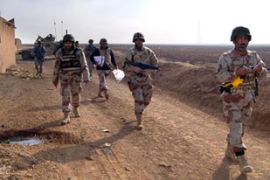Boys among latest Iraqi casualties
Bodies of 21 males found near Baghdad as Sunni and Shia clerics trade accusations.

Published On 25 Nov 2006
The attack on the family may have had a sectarian motive as the religiously mixed province of Diyala is rife with sectarian killings between Shias and Sunnis. But sometimes tribal feuds and gangsters driven by profit also account for some violence.
Meanwhile, fearful Iraqis spent sleepless nights guarding their homes and asking who would be next after militia men burnt mosques and houses in a Sunni enclave following the worst bomb attack since the US invasion.
The city of seven million was under a tight curfew for a second full day since Thursday’s bombing in which more than 200 Shias died.
Al-Dari’s reaction
Against this backdrop of worsening sectarian tensions, the Sunni Muslim cleric, Harith al-Dari, sidestepped on Saturday an invitation to give his followers specific orders not to kill Shia Muslims.
Shia leader Moqtada al-Sadr, who heads the Mahdi Army militia, said on Friday that al-Dari and other Sunni leaders must issue religious rulings, or fatwas, to fellow minority Sunnis forbidding the killing of Shias or membership of the al-Qaeda group.
If al-Dari meets that and other conditions, al-Sadr said he would oppose the arrest warrant which the Iraqi government issued against al-Dari last week on suspicion of links to violence.
But al-Dari, who arrived in Cairo from Syria this week, said he refused to make a distinction between Sunnis and Shias.
| “The raids come after a bombing campaign in Baghdad on Thursday that killed more than 200 Shia“ send your views |
Speaking at a news conference in Cairo, he said: “We have condemned from the first months the killing of Iraqis … whether they were Arabs or Kurds, Muslims or non-Muslims, without going into details.”
He gave a list of occasions when his organisation, the Association of Muslim Scholars, has issued specific condemnations of killings and resolutions it had voted for.
Al-Dari blamed both the US and successive Iraqi governments for the collapse of law and order in Iraq after the US invasion of 2003.
“The occupation administration is a failed administration, a stupid administration which can be summed up by saying that it has destroyed Iraq, state, people, institutions and resources.
“Its political operations have brought it today to a dead end.. It has brought Iraq to the edge of the abyss. The political process, under its various titles, took it from bad to worse, from failure to greater failure.”
Al-Dari appealed to Arab governments to withdraw their recognition from the Iraqi government.
“I call on the Arab states and Egypt to stand up to this biased government, this sectarian government … this government which exploits sectarianism”.
However, Tariq al-Hashimi, Iraq’s vice-president and a leader of the predominantly Sunni Iraqi Islamic Party, told Al Jazeera on Saturday that “everybody should be equal if we are to go in for national reconciliation, and everybody should speak in the same language. Hopefully we can move forward to a genuine national unity government.”
Bomb factory hit
Also on Saturday, the US military said it had killed 22 armed men in two separate clashes north of Baghdad, shortly after carrying out air strikes that destroyed a bomb-making factory.
The US said in a statement that its military had clashed with fighters and killed 12 men including one suspected of rigging cars with explosives on a road north of Baghdad.
In an earlier statement it had said that 10 people were killed in air strikes on a bomb-making factory in Taji. Taji is a mostly Sunni town near a major US air base.
It said US forces suffered no casualties, but a teenager was killed and a pregnant woman wounded in one of the clashes.
Source: News Agencies